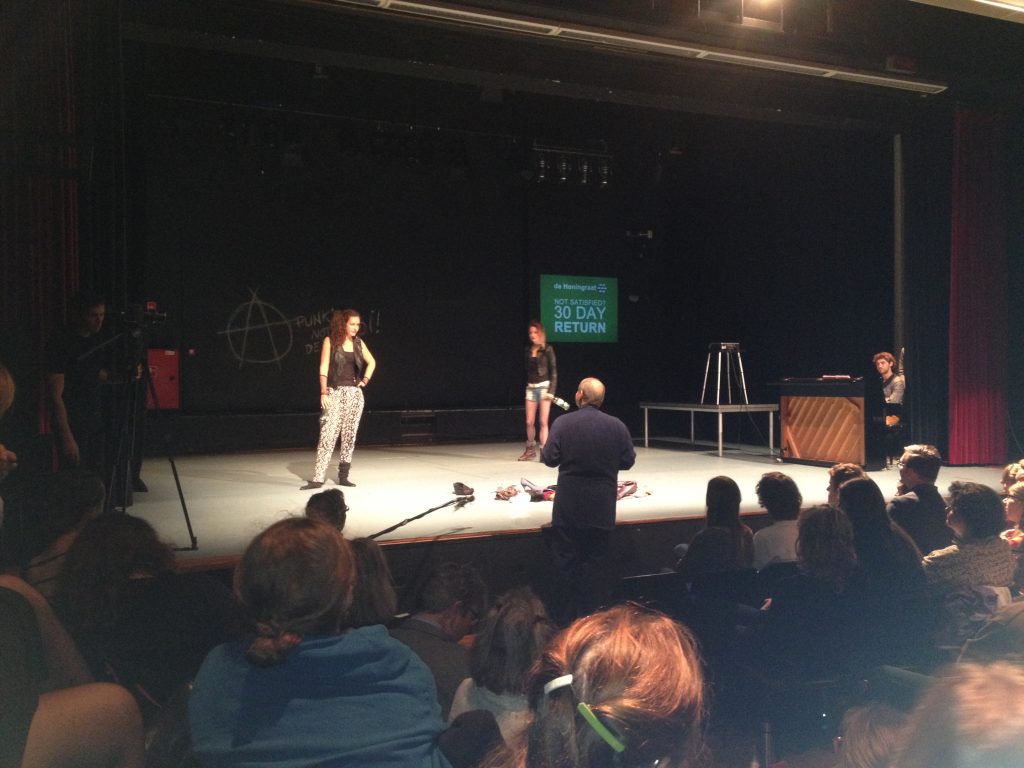In een vol Universiteitstheater gaf Pierre Audi dinsdag 6 oktober een masterclass voor jonge zangers, dramaturgen en regisseurs. Drie scènes waren voorbereid door de studenten en werden daarna vakkundig gefileerd door Audi.
“Sorella, que dici?…. Prenderò quel brunettino”, uit Mozart’s Così fan tutte begon als een scène van twee punkmeisjes die gegrepen werden door consumentisme. De regisseur en dramaturgen in opleiding legden uit dat het hun idee was de begeerte te vertalen naar kooplust, wat de jonge meisjes corrumpeerde. Opera als kritiek op het kapitalisme. Het klinkt heel logisch, nu iedereen zijn mond vol heeft over de kwalijke geur van het neoliberalisme. Maar Audi liet er geen spaan van heel. Hij vroeg naar motieven, psychologie, actie. Alle dingen die hij niet terugzag in de korte enscenering. Want dat was zijn eerste les:
Les 1: complexiteit is belangrijk.
Platte personages vervelen al na één minuut. Maatschappijkritiek zonder internalisering is niets. Zelfs in een korte scène heb je zes à zeven kleuren nodig in het psychologische palet van de zangers. Je moet er geloofwaardige, echte mensen van maken.
Les 2: niemand is geïnteresseerd in een idee. Mensen zijn geïnteresseerd in mensen.
Zie het publiek als een zaal vol regisseurs, zij verbinden alle onderdelen. Zorg ervoor dat al het handelen van de personages gemotiveerd is. Ga er vanuit dat de componist weet wat hij doet en dat alle onderdelen nodig zijn. Maar denk er wel zelf over na.
Les 3: heb de moed de opera naar je hand te zetten.
Wat logisch is, is niet per se ook wat nodig is. Als je automatismen gaat gebruiken, ben je verloren. Alles, alles, alles moet een betekenis hebben. Breek je materiaal in allemaal kleine stukjes op, zodat de structuur duidelijker wordt.
Het einde van de eerste akte van Wagner’s Die Walküre was de laatste scène in de masterclass. Sieglinde wordt verliefd op de vreemdeling in haar huis, die haar verloren gewaande tweelingbroer blijkt te zijn. De zangers zitten aan een tafel, en zingen prachtig, maar braaf tegen elkaar aan. Het idee dat Sieglinde Siegmund overheerst komt niet over. Audi verplaatst de tafel en laat Siegliende er bovenop zitten. Dat is dominantie! Siegfried moet op zijn buik op de vloer. Een kleine interventie, die gelijk de spanning tussen de twee zangers opvoert. En dat is meteen de belangrijkste les van de maestro:
Les 4: het gaat om de zangers.
Je kunt decor, muziek en het spektakel voor elkaar hebben, maar het draait uiteindelijk om wat er in en met de zangers gebeurt. Zorg ervoor de de zangers elkaar niet spiegelen. Dat is niet interessant, dat levert geen dramatische spanning op. Weet waar ze vandaan komen, analyseer je scènes. Aldus sprak de maestro.
Het lijkt zo simpel en logisch, de manier waarop hij met een tafel, twee stoelen en een paar lappen stof scènes tot leven brengt. Maar waar de studenten, die natuurlijk niet zijn vijfendertig jaar ervaring hebben, blijven steken in ideeën en theorieën, wordt het bij hem pure magie.

